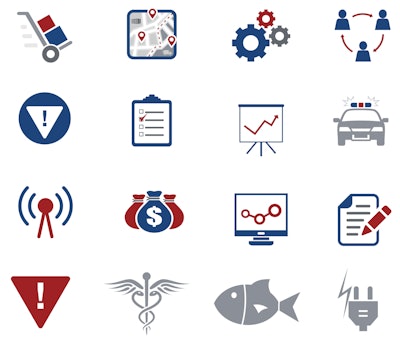
Editor’s Note: This article was prepared by FreightWatch International, the logistics security division of Sensitech Inc.
As cargo criminals become more sophisticated and daring, global manufacturers, logistics companies, and supply chain stakeholders continually look for ways to securely protect their supply chains and cargo.
For many, Electronic Freight Security (EFS) programs are the answer, as they provide real-time, end-to-end monitoring of cargo shipments through embedded tracking technology. This document will inform stakeholders of the evolving risks of cargo theft, the benefits of an EFS program, and what such a program encompasses.
Why implement an EFS program?
Cargo theft is on the rise. Since 2008, FreightWatch International Supply Chain Intelligence Center (SCIC) has documented increases in both the volume and the value of cargo theft year-over-year with no known slowdown on the horizon.
New threats require new actions. As cargo criminals become more sophisticated, new kinds of threats arise. For instance, fictitious pickups (FPUs) are on the rise. In these events, cargo thieves arm drivers with fake IDs or devise fictitious businesses to pick up cargo as a way to divert and steal goods. These criminals know how to navigate load boards and effectively target high-value loads.
GPS jamming is becoming more prevalent throughout the cargo theft world. Cargo thieves use jamming techniques to intentionally block or interfere with communications. Signal jamming devices cannot be purchased legally in the United States. In fact, the Federal Communications Commission recently fined a Chinese electronics manufacturer nearly $35 million for the alleged marketing of close to 300 models of signal jamming devices to U.S. consumers. While steep fines may eventually discourage the illicit activity, EFS programs used in conjunction with cellular- triangulation technology are a mainstay for jamming deterrence.
High-risk products. Any commodity that has value on the black or grey market is a target today. Within sophisticated, organized-crime networks, these highly targeted products can easily be resold locally, regionally and internationally.
Dangerous routes and hot spots. Companies that ship through known “hot spots” or via dangerous routes are more prone to cargo theft. If these high-risk areas cannot be avoided, companies should employ the best security option that will not only protect cargo, but also assist in the rapid recovery of stolen shipments.
Insurance compliance. Depending on the nature of the cargo, some insurance policies require that EFS practices be utilized on high-value products to better protect cargo.
The high cost of stolen products. For an industry like food, there are many costs associated with the theft of product, such as replacement costs, higher security, and public relations efforts to control a damaged brand.
These are just a few of the reasons that manufacturers are increasingly turning to EFS programs to secure their cargo. EFS programs are considered to be not only industry best practice, but they are now also common practice among companies that want to drive a competitive advantage, reduce risk, and increase visibility and security within their supply chains.
Considering an EFS program?
Use this self-assessment questionnaire to determine if your company is at risk and could benefit from an EFS program:
If you…
• Ship cargo that is desirable to cargo thieves.
• Ship cargo that is valued at more than $100,000.
• Have highly publicized new product introductions where cargo theft would be detrimental to your public image.
• Ship to destinations that are high risk, or via routes that are in high-risk areas.
• Ship cargo on Fridays or holidays and stage it before delivering.
• Ship internationally from your site.
• Broker loads to third parties.
• Maintain a “just-in-time” supply chain that cannot handle disruption.
• Have suffered from a cargo theft in the past and are concerned it will happen again.
And if you don’t...
• Have a large, experienced security team dedicated 24 hours per day, seven days per week to logistics security.
• Use team drivers for high-value loads.
• Have direct law enforcement relationships to assist with cargo security incidents.
• Conduct frequent background checks for regular, seasonal, and temporary workers.
• Implement cargo security protocols and write them into carrier contracts and service-level agreements.
Then you may want to consider an EFS program.
How EFS works
EFS technology is an integral part of global security programs aimed at maintaining supply chain integrity from one end of the chain to the other. This technology ensures that shippers, carriers, drivers, and distribution teams secure valuable goods using the latest in security best practices. While these EFS programs are comprehensive, they specifically focus on the highest risk areas of transportation, where the majority of full trailer load cargo theft occurs.
The best-in-class programs provide covert cargo security that combines EFS technology, which is delivered through embedded devices in the cargo, with sophisticated real-time monitoring services. Real-time location, status, and condition data are transmitted via Internet-of-Things (IoT) and assisted-GPS devices, and enable critical activity alerts that protect the supply chain and mitigate the risk of cargo theft.
These programs not only enable cargo monitoring, but also provide tracking, reporting, and recovery of high-value shipments in transit between manufacturing warehouses and delivery sites. All of this is delivered with the highest attention to security compliance and the management of pre-defined security protocols.
The most effective EFS solutions use technology that works in impaired environments where other GPS devices cannot. For instance, aluminum containers and cargo holds are some of the most challenging environments for regular GPS devices, but not for sophisticated EFS solutions.
Who’s on an EFS security team?
A key part of any EFS solution is the team behind the solution. Cargo security experts employed by logistics security companies work with product and shipping experts on the customer side to ensure the most robust, secure program.
Here are a few of the roles involved in an EFS program and the associated responsibilities:
Implementation. The initial stage of an EFS program involves the building of security best practices based on the type of cargo shipped and typical routes used. The logistics personnel at the security company capture all relevant data, apply best practices, and input key information into a web-based solution. They also develop pre-determined geo-routes designed to utilize low-risk lanes. Escalation protocols are developed to ensure maximum compliance and security of the driver and cargo. Security professionals scrutinize tactics, techniques, and procedures used by cargo thieves and make appropriate adjustments. For instance, risk management officers ensure that processes are in place to communicate security protocols to shipment operators, as well as to capture critical shipment information prior to departure. On the customer side, logistics personnel ensure that before a load leaves the dock, a tracking device is covertly embedded per security protocols. The device is then activated by the security company for monitoring from the point it leaves the dock to when it arrives at its desired destination.
Training. Compliance with security protocols is critical, as immediate response and resolution to noncompliant incidents reduces opportunities for theft. Once the initial parameters of the program have been established, the logistics company will set up customer training. Typically, logistics, supply chain, security personnel, and third-party suppliers attend the training.
Monitoring and tracking. FreightWatch International Command & Control Center (C3) representatives provide point-to-point cargo monitoring according to pre-defined security, escalation, and communication procedures. These experts will initiate steps for the resolution of issues encountered with shipments requiring constant surveillance, such as a deviation from a pre-determined route, unauthorized stops, or failure to comply with transport and delivery protocols.
Program oversight. Typically, there are program managers who provide operational and compliance metrics, such as motor carrier behavioral patterns related to risk, and weekly performance evaluation of shipments in transit. Program managers receive cargo theft intelligence and work with a company’s logistics team to assess data and maintain protocol expectations.
Emergency response. In the event of a suspected security breach, or theft incident, an EFS solution provides immediate escalation processes. If there is a violation of pre-defined security protocols, emergency response teams can immediately contact the driver to assess the situation. If escalation is required, these teams will engage with law enforcement to recover the stolen shipment. Logistics security companies have law enforcement liaisons on staff who are industry experts in cargo crime, transportation, and logistics security, and typically have extensive law enforcement contacts as well.
On-going reporting. Many logistics security companies also have analysts, who generate statistically rich reports, and provide insights for proactive cargo security, recommendations of best practices, overviews of carrier pattern risks, and information for continuous improvement. These reports also help to optimize motor carrier return-on-investment and ensure that carriers are adhering to shipping best-practice standards.
As a complete virtual escort and “eyes-on management,” an EFS solution removes the vulnerabilities associated with human-based escorts, such as limited coverage, lack of scalability, and high costs. And most importantly, an EFS program significantly increases the chances of recovery in the unfortunate event of a theft.
EFS in action: seafood recovery
Using tracking technology embedded in a load of seafood routed from Massachusetts to California, FreightWatch helped track the cargo after it was stolen in Jackson, Miss. Once Miami was identified as the location of the cargo, a FreightWatch risk management officer located the shipment in-route and kept the authorities up to date. Within two hours, the criminal was apprehended and the shipment recovered—and using data from the tracking device, an accomplice was identified. FreightWatch continued to monitor the shipment after it was impounded via temperature sensors to ensure that the product kept its integrity until it reached its final destination.
















